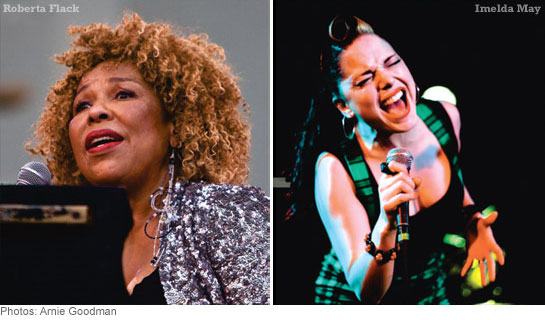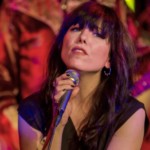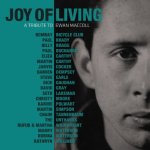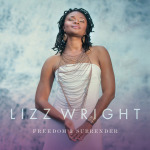
ROBERTA FLACK
Born February 10 in Black Mountain, NC, Roberta Flack began playing piano young, winning several awards, eventually receiving a full scholarship to Howard University at age 15. After graduating, she began teaching piano at several schools, as well as out of her own home, while spending nights and weekends gaining a reputation playing in Washington D.C. clubs.
One night in the summer of 1968, while performing at a benefi t, musician Les McCann was blown away by Flack’s voice and took her to Atlantic Records, where she was quickly signed, recording her debut album, First Take, in just 10 hours that November. Flack went on to record her second album, Chapter Two, in 1970, beginning her fruitful relationship with Donny Hathaway.
Flack gained national attention when Clint Eastwood featured “The First Time Ever I Saw Your Face” in his fi lm Play Misty for Me. The track went to Number One and won Record of the Year at the 1972 Grammy Awards, where she also won for “Where is the Love,” a collaboration with Hathaway. The following year, Flack walked away with more Grammys for her biggest hit, “Killing Me Softly With His Song,” including Record of the Year and Best Female Pop Vocal Performance. The follow-up single, “Feel Like Makin’ Love,” also went to Number One.
Following such great success, Flack continued to tour and record extensively, including more Grammynominated work and several highprofile collaborations, with artists ranging from Yoko Ono to Peabo Bryson to Miles Davis. Most recently, she performed at the 2010 Grammy Awards, singing “Where is the Love” with Maxwell. A born nurturer and teacher, Flack continues to donate her time and resources to young artists and education, recently establishing “The Roberta Flack School of Music” in the Bronx. She is currently finishing an album of Beatles songs which is not yet scheduled for release.
IMELDA MAY
Imelda May Higham was born on July 10, 1974, in Dublin, Ireland. Raised in a musical household in Dublin. Her five brothers and sisters had a strong influence over her musical taste, both teaching her how to play guitar and taking her to record shops as a young girl. May grew up listening to her sister’s traditional folk music and her brother playing Elvis, Eddie Cochran and Gene Vincent. She began singing at age four, and by 14 she was singing in an ad for fish sticks. The blues clubs started calling, and she responded, even getting kicked out of her own performance at Dublin’s Bruxelles club for being too young.
“I spent one year in an ad college, a tech, just to see how it would be, because I loved art, but I was already singing in clubs at that stage,” she said. May decided to pursue a music career full time. After singing and maturing her sound for years in Ireland, she moved to London in 1998, where she teamed up with Mike Sanchez and the swing troupe Blue Harlem. Sanchez’s group had collaborated with Beck for Jeff Beck & The Big Town Playboys’ 1993 album, Crazy Legs.
In 2005, No Turning Back was released under the name Imelda Clabby and reissued in 2009, under the name Imelda May. Love Tattoo was released in 2008, and it earned her the Best Female Newcomer Award at the Irish World Newspaper Awards.
Beck selected May to sing on his new album, Emotion & Commotion, and she appeared with him at the 2010 Grammy Awards, singing “How High the Moon,” for a tribute to the late Les Paul. Her next album will be out in 2010, and she tours this spring both with Jeff Beck and solo, including a performance at Bonnaroo.
Elmore: What are you listening to right now?
Roberta Flack: I am listening to the sound of my voice from the ’70s, ’80s, ’90s and yeah, 2000, because I still take voice lessons. Sometimes we forget when life was simple. I’m listening how to make a point by remembering that you are telling a story. My teacher, Frederick Wilkerson, would say, “The best way to perform, Roberta, is to remember that you are telling somebody something. If Billie Holiday is saying, ‘Why must you be so mean to me?’ somewhere in that line is another thought there, and it might be pain or it might be sarcasm. And if you can remember that, then you will be safe.”
Imelda May: At the moment, because I’m in the studio mixing for the most part of the day, I’m listening to the music I’m needing to learn for various things. I recently sang with Jeff Beck, it was a gig he did with Eric Clapton and U2, and that was “Lilac Wine.” The next one that I’m learning is the “Boogie Woogie Bugle Boy.” I’m learning that to sing on an album on Monday with a big band.
EM: What was the first record you ever bought?
RF: The first record I ever paid money for was a recording of the opera Tosca, because I love Renata Tebaldi.
IM: A Billie Holiday record, just the best of, it was a mix. It had “Good Morning Heartache,” “Lover Man,” “I Love You Porgy,” “My Man,” some beautiful songs. The record store was selling off these records for about a dollar, just to get rid of them. I picked up some records and I realized the ones that I seemed to like most had “Ace” written on them or “Chess,” I learned a lot just by accident. I figured out that I liked these Chess recordings, not knowing about the recording studio because I was only a kid. I had Howlin’ Wolf, Willie Dixon, all kinds of great artists that I was just picking up. I learned a lot just from buying those records. I was probably about 15.
EM: Where do you buy your music?
RF: Colony Records to buy classical music and to buy everything—and I do—and I go to Best Buy. But like everybody else, I am online, because you can buy everything online. Why not? You can buy it cheaper and quicker and sometimes free shipping.
IM: When we’re on the road touring, I tend to venture into old record shops and buy more records. And sometimes stuff that I know that I love, I pick up. Other times I take a chance and ask whoever is running the record stand just to tell me a bit of it and take a chance, and I find all kinds of new artists that I like.
EM: What was the first instrument you played?
RF: Piano. I was surrounded by music. I went in playing very simple little stuff, and I could read a little bit, because my mom was a church organist. My grandmom played violin—she called it a fiddle—sort of played upside down. My father played self-taught stride piano like Erroll Garner, and my mother’s brother, Uncle Pindar, my grandmother and my aunt all played by ear. I was very surrounded.
IM: The guitar. I learned my first chords when I was probably about 12 or 13. My sister Maria played guitar and she taught me my first chords. I’m not a big guitarist by any means, but I can play enough to get by with a rhythm guitar. I can play enough to write my songs on them.
EM: What brought you to the instrument you now play?
RF: I planned to be a concert pianist, I did not plan to be a singer. I worked hard and studied and practiced piano many, many hours. My piano teacher, Alma Blackman, was a genius. I went every Saturday to have a lesson with her, and Alma had a sister named Margaret who has this wonderful contralto, this incredible voice that sounded like a viola. I walked in and there they were singing opera. I’m coming from “Amazing Grace,” so that was a great big jump. My brother and my cousins, everybody sang, everybody wanted to be like the doo wop singers.
IM: I was visiting the west coast of Ireland and a friend had a bodhran, and he didn’t seem to take to it. I just picked it up, and loved playing it. I went to the pub and sat in on the music sessions and sat in with all these fantastic old players. It’s a brilliant instrument. It’s just one skin drum and you play with a stick. Different countries play it different ways, but in Ireland we play it with a stick, mostly. You can play the melody as well as the rhythm. Your left hand is on the bass tones on it so you can play it closed up with your hand up or pushing the skin and almost change the tuning of it. It’s a wonderful instrument for rhythms and for tone, all in the one instrument. It’s like a compact drum kit, great for traveling, too. You can just put it on your hand and play. When I came back to Dublin, my brother Brendan played in a traditional band, so when I go home to Dublin I loved to sit in on sessions with him and play bodhran along with the band. I have been playing the bodhran since I was 19. I’m 35 now, so you can count back.
EM: Who would you like to write with that you haven’t?
RF: I would like to write more with Donny Hathaway. I only wrote a few little tidbits with Donny. I would like to write with Alicia Keys and Djavan, a Brazilian.
IM: If I’m going to name someone, I may as well go high up: I guess Tom Waits and Leonard Cohen, two fantastic songwriters. A lot of great songwriters unfortunately are dead and gone, like Willie Dixon. He was a brilliant songwriter, with a good groove, a catchy rhythm. He didn’t over elaborate, he just wrote to the point and really, really well.
EM: What musician influenced you most?
RF: Musically, my first teacher, Alma Blackman, Miles and Donny, but vocally probably Leontine Price and Carmen McRae.
IM: I can’t name any one, but definitely Billie Holiday and Gene Vincent and Howlin’ Wolf; they would be my main three. Billie Holiday started me off.

EM: What was the song or event that made you realize you wanted to be in music?
RF: I was not singing at all, I was playing classical, sometimes Gershwin, in an Italian restaurant in Georgetown, during the Kennedy White House days. One Christmas night, the owner said, “I have people lined up two or three blocks and I’ve got to get people out and let these other folks in, so play some Christmas Carols.” So I played, “Chestnuts Roasting On An Open Fire,” and they started to sing—they were drunk. I made the mistake of singing with them, and I was young and I sounded like I loved the song, because I do love the song. At the end of my set and I was getting up and the owner said: “You don’t know how to listen. If you do it again I’m going to fire you,” Why? Because they said, “Bring her back.” It turns out the maitre d’ had some connections at a Capitol Hill bar, and gets me booked into this bar. That’s the beginning of the story of my life. I didn’t consider giving up teaching until the assistant superintendent walked in to the bar one night and said, “I’ve been hearing about you. I think you sound fabulous and I don’t know what you are doing in this school. I think you need to send your resignation in, and if you don’t, I’m going to help you write it.” It was like, predestined.
IM: I was actually already in it before I realized that’s what I wanted to do. I was singing in these little clubs around Dublin at 16, these little blues clubs, and they had fantastic people come up and jam. I was sitting with a girl who was painting, and she said that she painted all the time; when she was happy she painted, when she was sad she painted, all these different times in life, when she had time off she painted. It was then I realized when I was happy I sang, when I was sad I sang and it was all about singing. And that’s when I realized I was already doing what I wanted to do, just because I absolutely loved it. I was already doing it before I realized this could be what I do for a living, and that’s when I committed to it, at 17.
EM: Who would you like in your rock and roll heaven band?
RF:I can tell you who would be the MC of the show, a guy named Tony Taylor. It’s hard, because I get so emotional. I’d have Derick Hughes and Marvin Gaye singing. Eric Gale for guitar… EM: Would you want Miles?No, not necessarily. I think he would just look at me, cross his hands and turn his back. I wouldn’t mind having Joe Zawinul on keyboards. Richard Tee can play organ, Steve Jordan could play drums. And put bass as Anthony Jackson. That’s it.
IM: I’d say Cliff Gallup on guitar, from Gene Vincent’s Blue Caps. I can’t answer that question, you just asked me to pick three particular people from the last 50 years; I can’t do that, too many people. And I found it a huge, huge honor to stand and sing with them in the place of Luke Kelly and Ronnie Drew (The Dubliners). This is dreadful, giving me no time to think. I just worked with Jeff Beck, which was magic. A lot of dreams that I’ve had have come true already.
EM: What’s your desert island CD?
RF: The desert music would be meditative music, as opposed to something with words, because I’m a thinker. I would listen to some sit-and-fold-your-hands-music. Or maybe I could do Pavarotti, any of his earlier recordings.
IM: God, you’re killing me with these questions. You’re killing me. It depends on the mood when I’m sitting on that desert island. I’d rather not be sitting on a desert island. I would say, possibly, Billie Holiday, Lady in Satin. And if I wanted to cheer myself up, it would be Gene Vincent, “Be-Bop-A-Lula.” That would have to be the two.






Be the first to comment!